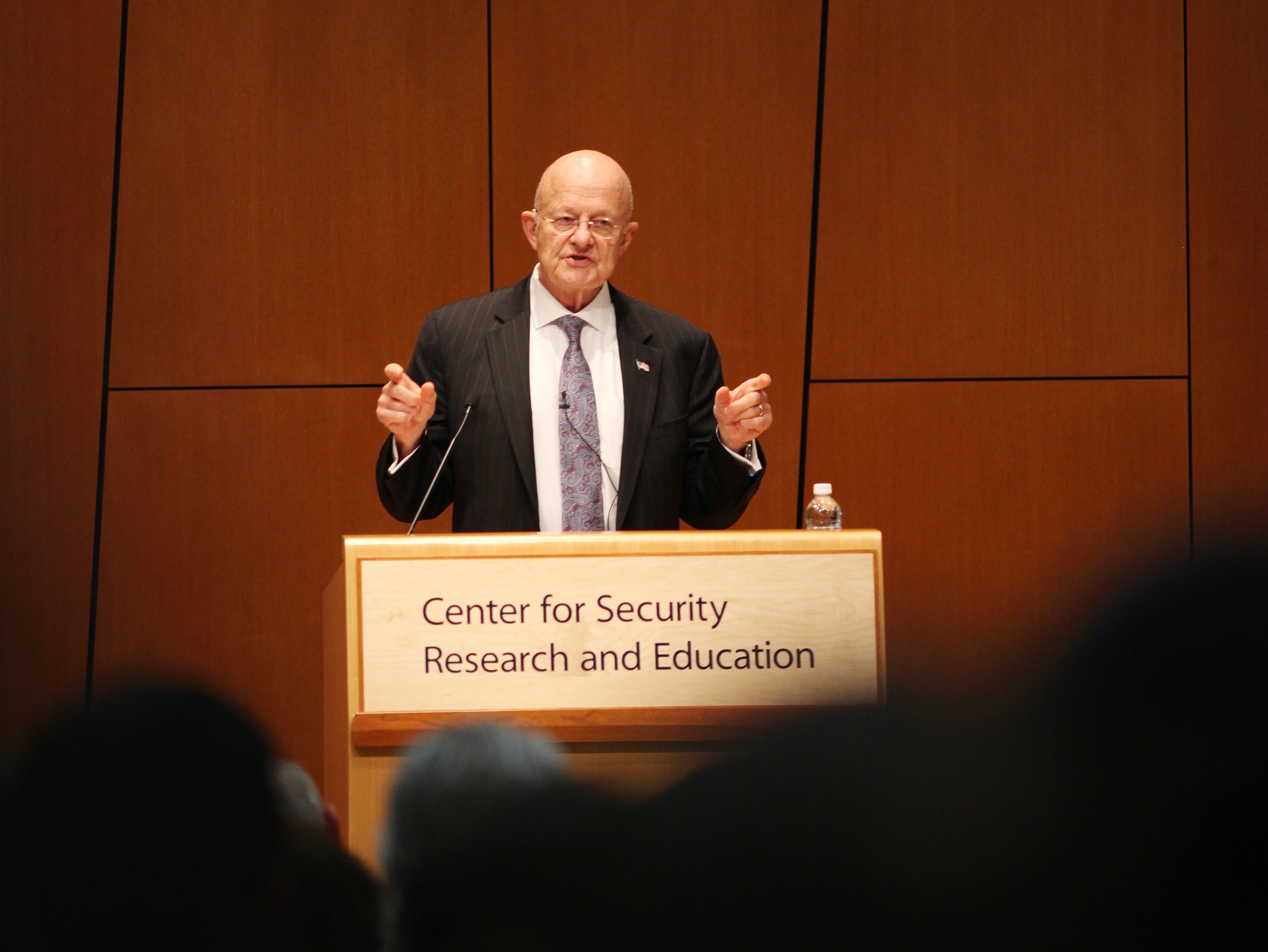UNIVERSITY PARK, Pa. – On the evening of Nov. 6, Penn State’s new Center for Security Research and Education hosted its inaugural guest speaker, Gen. James Clapper, former director of national intelligence in the Obama administration, in the Sutliff Auditorium of the Lewis Katz Building.
In comments interspersed with both humorous and serious anecdotes from his six-decade career in the U.S. military and national intelligence community, Clapper outlined what he views to be the most critical security and intelligence challenges facing the U.S. Since he has achieved what he calls “intelligence geyser-dom,” he said he considers it his duty to take on a more visible role in educating the public on critical intelligence issues in talks like this one and in the news media.
What does he view as the biggest threats to U.S. security? Adversarial countries, like Iran, North Korea, Russia, and even China; the vastness of the internet, and particularly the “internet of things”; artificial intelligence, where he compared the global competition within the field to that of the race to the moon; and the environment and disease, explaining that we currently have ideal circumstances for the spread of microbes, especially antibiotic-resistant strains.
“Russia is, right now and for the foreseeable future, our greatest adversary,” said Clapper. “With the sophistication of their intelligence gathering, we are only beginning to see what they did in our election, and what they continue to do, since they have been emboldened by their success.”
While he places Russia and China in the first tier of threats to the U.S., Clapper noted that North Korea and Iran are also important U.S. adversaries, noting that pre-emptive military action in North Korea by U.S. forces would be “cataclysmic.”
“They are not going to denuclearize. That train left the station years ago. Denuclearization shouldn’t be the prerequisite for talks,” he said regarding the Trump administration’s stance on the subject, adding, “We should tone down the rhetoric.”
Clapper also touched on the threat of climate change, explaining that heat waves, air pollution, and water shortages will occur in 50 percent of the world by 2035, and soil degradation will affect the world’s food supply, while melting ice in Polar regions will cause sea levels rise.
“Manmade or not, the consequences of climate change are becoming more frequent and more violent,” he said.
After finishing what he referred to as his “litany of doom,” Clapper paraphrased President Barack Obama on the U.S. role in the world: “When bad things happen around the world, they don’t call 911. They call Washington, D.C.,” making the point that if the U.S. doesn’t continue the tradition of stepping into the leadership role, another country will.
Before taking questions from the audience, Clapper summarized the measures of resilience of a country: governance, economics, society, infrastructure, security, and the environment. These measures are key to determining the resilience of the U.S. as it faces these modern challenges.
“This country is blessed in abundance,” he said. “Measuring, sustaining, and enhancing these measures is critical; it’s up to us.”
The Center for Security Research and Education (CSRE) at Penn State promotes research, teaching, and public outreach programs in the field of security. Led by retired U.S. Navy Vice Admiral James W. Houck, Distinguished Scholar in Residence at Penn State Law and the School of International Affairs, CSRE brings together scholars from diverse disciplines across the University to pursue comprehensive solutions to security challenges. CSRE also works to promote public discussion on the critical security issues of the day.
In introducing Clapper, Penn State President Eric Barron noted: “Security has become an increasingly important, multifaceted issue. To defend against these threats, we must take an interdisciplinary approach, which is what Penn State excels at. The Center for Security Research and Education reflects Penn State’s commitment to bringing these groups together on this critical issue.”

